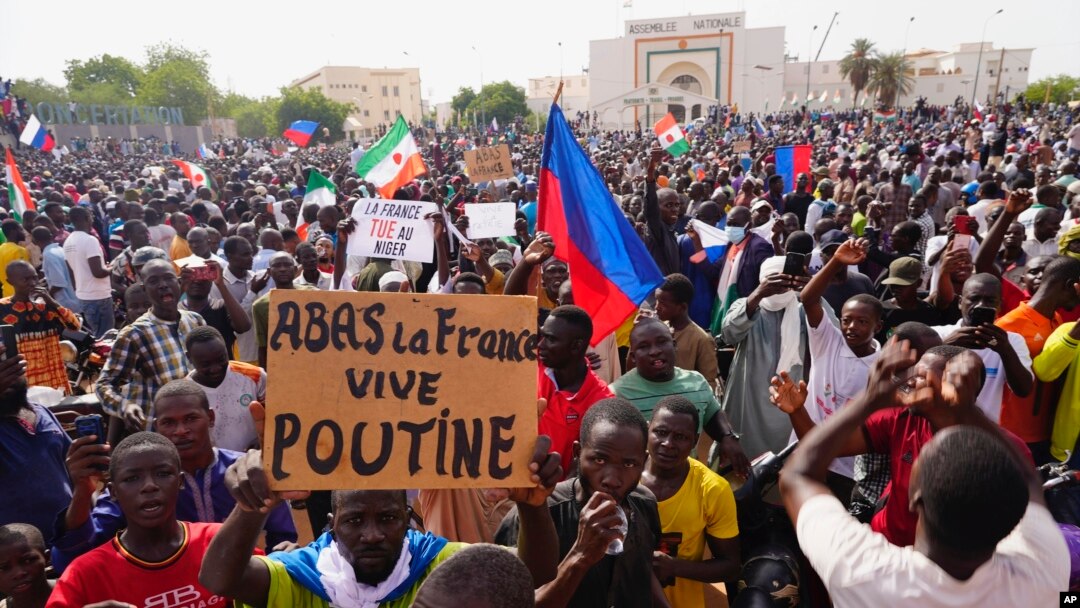President Mohamed Bazoum was overthrown on July 26 by his own guard, in the region's third putsch in as many years following takeovers in neighboring Mali and Burkina Faso.
After hostile crowds gathered on Sunday outside the French embassy and Niger accused France of plotting to intervene militarily, Paris said Tuesday it would withdraw its citizens and offered to evacuate other Europeans as well.
"In the face of a deteriorating security situation in Niamey and taking advantage of the relative calm in Niamey, an operation of evacuation by air is being prepared," the embassy said a message sent to French citizens.
The evacuations "will take place very soon in a very limited span of time," it said. The foreign ministry in Paris later said the evacuations would begin later on Tuesday.
There are an estimated 600 French nationals in Niger, not counting visiting tourists or French residents currently outside the country.
France has offered to evacuate German nationals from Niger, the German foreign ministry said in a statement, urging "all German nationals in Niamey to accept this offer."
In Rome, the Italian government said it was putting on a "special flight for those (Italians) who want to leave the country," adding that this was "not an evacuation." It said there were around 90 Italian nationals in Niamey, out of just under 500 across the country.
The West African bloc ECOWAS on Sunday slapped sanctions on Niger and warned it may use force as it gave the coup leaders a week to reinstate Bazoum.
The following day, the junta accused France of seeking to "intervene militarily," a charge which drew a French denial, while junta-ruled Mali and Burkina Faso warned any military intervention in Niger would be a "declaration of war" against them.
The events are unfolding in one of the poorest and most unstable countries in the world — a vast semi-desert nation that had already experienced four coups since independence in 1960.
Bazoum was feted in 2021 after winning elections that ushered in Niger's first-ever peaceful transition of power.
But his tenure was already marked by two attempted coups before last week's dramatic events, in which he was detained at his official residence by members of his elite Presidential Guard.
Guards chief Gen. Abdourahamane Tiani has declared himself leader, but his claim has been rejected internationally, from ECOWAS, the African Union and the United Nations to France, the United States and the European Union.
Bazoum was seen in a photo on Sunday sitting alongside Chadian leader General Mahamat Idriss Deby Itno, another pro-Western leader, who was sent to Niamey by ECOWAS.
According to Bazoum's PNDS party, the junta has arrested the country's oil, mining, interior and transport ministers, the head of the PNDS's executive committee, and a former defense minister.
France had at one point around 5,400 troops in its anti-jihadist Barkhane mission across the Sahel, supported by fighter jets, helicopters and drones.
But that mission had to be drastically refocused on Niger last year, when France pulled out of Mali and Burkina Faso after falling out with their juntas.
Today, the reconfigured French force has around 1,500 men, many of them deployed at a major air base near Niamey, while the United States, which also has an important air base in Niger, has around 1,100 personnel.
In all three Sahel countries, the disgruntled military intervened against elected presidents as the toll mounted from jihadist attacks.
Takeovers in Sahel countries have been accompanied by nationalist rhetoric and strident anti-French, pro-Russian demonstrations.
Mali in particular has forged close ties with Moscow, bringing in Russian military hardware and paramilitaries that Western nations say are Wagner mercenaries.
Junta supporters say France has failed to shield them from the jihadists, whereas Russia would be a stronger ally.
Information for this report came from AFP and Reuters.


